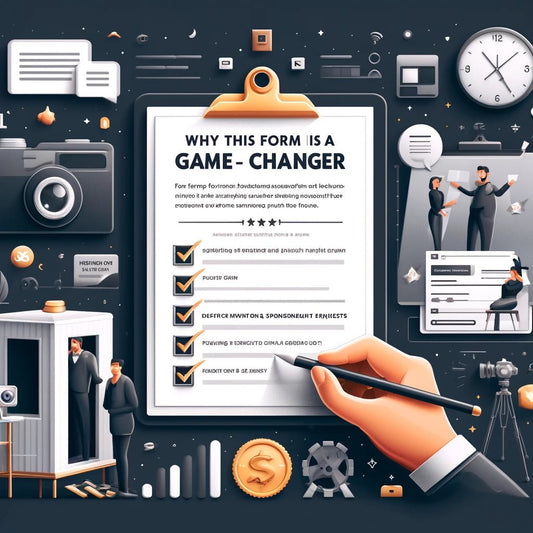
Boost Your Business with Effective Corporate Event Marketing Strategies
Share
.jpg)
Corporate event marketing plays a crucial role in the success and growth of businesses. It involves the strategic planning and execution of various events to promote and enhance the brand, generate leads, and strengthen relationships within the corporate world.
Corporate event marketing encompasses a wide range of activities, including conferences, trade shows, product launches, corporate retreats, and networking events. These events serve as platforms for businesses to showcase their products or services, engage with potential clients, and foster connections within the industry. A case study by EventMB highlights the importance of corporate event marketing for businesses, showcasing its significant impact on brand recognition, lead generation, business relationships, product showcasing, and employee morale.
Planning and organizing a corporate event requires meticulous attention to detail. It involves defining clear goals and objectives, budgeting and financial planning, selecting the appropriate venue and date, promoting the event effectively, and securing engaging speakers or entertainment.
The benefits of corporate event marketing are extensive. It helps in building brand recognition, creating a strong impression in the minds of attendees and potential clients. These events also serve as lead generation opportunities, allowing businesses to capture valuable sales prospects. Corporate events provide a platform for enhancing business relationships and showcasing products or services to a targeted audience. Organizing such events can boost employee morale and foster a positive company culture.
Measuring the success of corporate events can be done through various metrics like attendee satisfaction, new leads generated, sales conversion rates, and social media engagement. By analyzing these metrics, businesses can evaluate the effectiveness of their event strategies and make necessary improvements for future events.
To ensure successful corporate event marketing, businesses should consider certain tips such as understanding their target audience, delivering a memorable and engaging experience, utilizing technology and social media platforms effectively, and incorporating feedback and insights for continuous improvement.
What is Corporate Event Marketing?
Corporate event marketing refers to the strategic planning, organization, and execution of events by companies to promote their products or services, enhance their brand image, and engage with their target audience. It involves creating unique experiences that leave a lasting impact on attendees, such as conferences, trade shows, seminars, product launches, and corporate parties. Corporate event marketing plays a crucial role in building relationships, generating leads, and increasing brand awareness. It is a powerful tool for companies to showcase their offerings, connect with customers, and stay ahead of the competition. What is Corporate Event Marketing? Pro-tip: When planning corporate events, always focus on creating memorable experiences that align with your brand values and objectives.
Why is Corporate Event Marketing Important?
Corporate event marketing is important for several reasons. First and foremost, it offers numerous benefits to businesses. By organizing corporate events, companies have the opportunity to showcase their products or services to a targeted audience. This, in turn, enhances brand visibility and awareness, ultimately resulting in potential sales and partnerships.
Another crucial aspect of corporate event marketing is its ability to establish and strengthen relationships with clients, partners, and stakeholders. Through face-to-face interactions, trust and rapport can be cultivated, fostering long-term business relationships. Corporate events provide an ideal platform for companies to demonstrate their industry expertise and thought leadership, positioning themselves as leaders in their respective fields.
Moreover, corporate event marketing plays a vital role in boosting brand reputation, generating leads, and fostering business growth. It serves as a means to showcase the company's achievements, innovations, and success stories. This can significantly enhance the overall perception of the brand, attracting potential customers and industry influencers.
Types of Corporate Events
Discover the dynamic world of corporate events and the exciting possibilities they offer. In this section, we'll explore different types of corporate events that bring businesses and professionals together. From conferences and seminars that foster knowledge sharing, to trade shows and exhibitions that showcase industry innovations, to product launches that create buzz in the market. We'll delve into corporate retreats that facilitate team building, and networking events that cultivate valuable connections. Get ready to uncover the diverse landscape of corporate event marketing!Conferences and Seminars
Conferences and seminars play a crucial role in corporate event marketing strategies. These events serve as valuable opportunities for professionals in a variety of industries to engage in unique learning experiences and broaden their professional networks.
- Professional Development: Conferences and seminars provide attendees with the chance to participate in educational sessions and workshops designed to enhance their knowledge and skills.
- Networking: These events enable participants to connect with industry experts, establish valuable contacts, and foster beneficial partnerships.
- Knowledge Sharing: Conferences and seminars facilitate the exchange of ideas and best practices through engaging presentations and panel discussions.
- Brand Exposure: By presenting at conferences, companies can showcase their expertise and establish themselves as thought leaders in their respective fields.
- Lead Generation: These events attract potential clients, creating opportunities for businesses to generate qualified leads through interactive sessions and product demonstrations.
Trade Shows and Exhibitions
Trade shows and exhibitions are vital components of corporate event marketing. These events serve as excellent avenues for companies to exhibit their products or services to a targeted audience. By participating in trade shows, businesses have the opportunity to enhance the recognition of their brand and generate leads and sales. Moreover, these events offer valuable networking opportunities, enabling companies to establish connections with potential clients, partners, and industry influencers. Trade shows also provide avenues for educational and professional growth, offering seminars, workshops, and case studies. Overall, trade shows and exhibitions serve as powerful platforms for companies to promote their brand, connect with their target audience, and thrive in the competitive corporate environment.
Product Launches
- Product launches are crucial events for companies to introduce new products to the market.
- They serve as opportunities to create buzz, build anticipation, and generate excitement among customers.
- Here are some key aspects to consider when planning a product launch:
- Set clear objectives: Define what you want to achieve with the product launch, whether it's increasing sales, expanding market share, or enhancing brand awareness.
- Choose the right venue and date: Select a location that aligns with your target audience and the image you want to convey. Pick a date that allows for maximum attendance and media coverage.
- Create a strategic marketing campaign: Develop a comprehensive promotional strategy that utilizes various channels, including social media, email marketing, and public relations.
- Ensure a captivating presentation: Craft a compelling narrative around your product, highlighting its unique features and benefits. Use visuals, demonstrations, and testimonials to engage attendees.
- Follow-up and measure success: Track key performance indicators like sales, customer feedback, and media coverage to evaluate the success of your product launch.
- Historically, one iconic product launch was that of the iPhone in 2007.
- Apple revolutionized the mobile phone industry with its groundbreaking device, capturing the public's attention and setting new standards for innovation and design.
- The iPhone product launch showcased the power of a well-executed product launch in creating immense excitement and generating unprecedented demand.
Corporate Retreats
Corporate Retreats are an essential element of any corporate event marketing strategy. They play a significant role in team building, professional development, and fostering a positive corporate culture. When planning a Corporate Retreat, there are several key factors to consider.
- Location: Choose a venue that provides a serene atmosphere and offers facilities for both work and relaxation to ensure a successful Corporate Retreat.
- Activities: Incorporate team-building exercises, skill workshops, and networking opportunities into the agenda to enhance collaboration and build strong interpersonal relationships.
- Agenda: Develop a well-structured agenda that strikes a balance between work sessions, social activities, and downtime. This will keep participants engaged and energized throughout the Corporate Retreat.
- Goals: Clearly define the objectives of the retreat, ensuring they are aligned with broader business goals. By doing so, participants will understand the purpose of the event and its relevance to the organization.
- Feedback: Gather feedback from participants after the Corporate Retreat to evaluate its effectiveness and identify areas for improvement in future events.
Networking Events
- Networking events play a crucial role in corporate event marketing by providing opportunities for professionals to connect, collaborate, and build valuable relationships. These Networking Events facilitate networking and allow individuals to expand their professional contacts and create new business opportunities. Here are some key aspects of Networking Events:
- Increased connections: Networking Events enable professionals to meet like-minded individuals, form partnerships, and establish a strong network.
- Information exchange: These events provide a platform for sharing knowledge, experiences, and industry insights, fostering professional growth.
- Potential collaborations: Networking Events often lead to collaborative projects and partnerships that can benefit businesses and individuals alike.
- Building reputation: Active participation in Networking Events can enhance one's professional reputation and visibility within the industry.
- Business opportunities: By connecting with industry leaders and decision-makers, Networking Events can create opportunities for career advancement and business growth.
Planning and Organizing a Corporate Event
When it comes to planning and organizing a corporate event, there are several crucial aspects to consider. In this section, we'll explore the key steps needed to bring a successful corporate event to life. From defining clear goals and objectives to strategizing an efficient budget, deciding on the perfect venue and date, and implementing effective event promotion and marketing tactics, we'll cover it all. Plus, we'll delve into the importance of booking engaging speakers or entertainment to make the event truly memorable. Let's dive in and uncover the secrets behind a well-executed corporate event!Defining Goals and Objectives
Defining clear goals and objectives is essential in corporate event marketing. It lays the groundwork for planning and organizing a prosperous event. Here are some effective tips for establishing goals and objectives:
1. Identify the purpose: Determine the desired outcome of the event, whether it is to raise brand awareness, generate leads, or strengthen business relationships.
2. Quantify your goals: Set specific and measurable targets, such as generating a predetermined number of leads or achieving a specific level of attendee satisfaction.
3. Align with company objectives: Ensure that your event goals are in line with the overall objectives of your organization and contribute to its growth.
4. Consider the target audience: Understand the needs and expectations of your target audience and tailor your goals to meet their requirements.
5. Build a timeline: Establish specific deadlines and milestones to keep your event planning on track and measure your progress.
By clearly defining your goals and objectives, you can concentrate your efforts on delivering a successful event that aligns with your company's vision and produces meaningful results.
Remember to regularly evaluate and measure the success of your event against your defined goals and objectives to refine your future event strategies.
Budgeting and Financial Planning
- These are essential elements of corporate event marketing. They play a crucial role in ensuring that the event remains within the allocated budget and achieves its financial objectives. To effectively manage the finances, follow these steps:
- Estimate Costs: Begin by identifying all the expenses associated with the event, such as the venue, catering, equipment, marketing materials, and staff.
- Set a Budget: Allocate funds to different areas based on their priorities and the available resources, while considering the budgeting and financial planning aspects.
- Research and Compare Prices: Obtain quotes from various suppliers to secure the best possible deals, which align with the budgeting and financial planning goals.
- Create a Contingency Fund: It is crucial to set aside a portion of the budget for unexpected expenses that may arise during the event, in line with the principles of budgeting and financial planning.
- Track Expenses: Keep a regular review and update of the budget to ensure that the event stays on track, making any necessary adjustments when required, in accordance with proper budgeting and financial planning.
- Monitor ROI: Continuously evaluate the return on investment to assess the effectiveness of the event and gain insights for making informed decisions regarding future events. This step is an integral part of budgeting and financial planning.
Selecting Venue and Date
When selecting a venue and date for a corporate event, it is crucial to follow a series of important steps. First, define your event goals and objectives to determine the type and size of venue that will be required. Additionally, establish a budget and financial plan to guide your venue selection. It is also necessary to research potential venues that align with your event theme and requirements. Consider the location and accessibility of the venue for attendees, ensuring that it is convenient for everyone. Moreover, evaluate the available facilities and amenities, such as audiovisual equipment and catering options, to ensure they meet your event's needs.
Checking the availability of the venue on your desired event date is another essential step. Make sure to review the venue's policies and contract terms, including cancellation and refund policies, before making any final decisions. To further assess the venue's suitability and ambiance, conducting site visits is recommended. It is also advisable to consult with your team and stakeholders to finalize the venue selection.
Once you have narrowed down your options, negotiate the terms and pricing with the venue management to secure the best deal. Finally, confirm the booking by signing the contract and making the necessary payments. By following these steps, you will be able to strategically select a suitable venue and date for your corporate event.
Event Promotion and Marketing
Effective event promotion and marketingAre you looking to make your corporate events a huge success? Here are some key strategies to consider:
- Create a compelling event website and landing page that provides detailed information and allows attendees to easily register.
- Utilize email marketing campaigns to reach out to potential attendees and keep them engaged with regular updates.
- Harness the power of social media platforms to promote your event, engage with your target audience, and generate excitement.
- Partner with industry influencers to help spread the word about your event and increase its reach.
- Implement targeted advertising campaigns to reach a wider audience and attract relevant attendees.
- Offer enticing early bird discounts and incentives to encourage early registrations and boost ticket sales.
- Explore partnerships and collaborations with other organizations to cross-promote your event and expand your reach.
- Utilize content marketing strategies to create valuable event-related content and drive organic traffic to your event website.
- Host pre-event webinars, podcasts, or live streams to generate excitement among potential attendees and provide valuable insights.
Booking Speakers or Entertainment
Booking speakers or entertainment is a crucial aspect of corporate event marketing. It adds value to the event, enhances attendee experience, and helps achieve the event's goals. Here are some factors to consider when booking speakers or entertainment for a corporate event:
Benefits of Corporate Event Marketing
Discover the incredible advantages of corporate event marketing in this dynamic section. From building brand recognition to generating leads and sales, enhancing business relationships, showcasing products or services, and even strengthening employee morale, we'll explore the diverse and powerful benefits that come with hosting corporate events. Get ready to dive into a world where connections are formed, brands are boosted, and businesses thrive like never before.Building Brand Recognition
Building brand recognition is an essential aspect of corporate event marketing. By implementing various strategies, companies can effectively increase their visibility and establish a strong brand presence. Here are some effective techniques for building brand recognition at corporate events:
- Create an eye-catching booth design that incorporates your brand logo and colors.
- Showcase your brand's products or services through interactive demonstrations and activities to engage with attendees.
- Leave a lasting impression on attendees by utilizing branded merchandise and giveaways.
- Elevate your company's status as a thought leader in the industry by hosting educational sessions or workshops.
- Partner with influencers or industry experts to promote your brand and attract a wider audience.
By implementing these strategies, companies can successfully build brand recognition and establish themselves as industry leaders in the corporate event space.
Generating Leads and Sales
Generating leads and sales is a crucial objective of corporate event marketing. By creating opportunities for networking and showcasing products or services, events can effectively generate new leads and drive sales. Here are some tactics to achieve this:
1. Engage attendees: Create interactive experiences such as product demonstrations or interactive booths to capture attendees' interest and encourage them to learn more about your offerings.
2. Offer incentives: Provide special offers or discounts exclusively for event attendees to incentivize them to make a purchase or sign up for your services.
3. Capture contact information: Implement lead capture strategies like giveaways or contests to collect attendee contact information for follow-up sales efforts.
4. Follow-up promptly: After the event, reach out to leads with personalized messages to nurture the relationship and convert them into customers.
5. Measure results: Track the success of your lead generation and sales efforts by monitoring conversion rates and revenue generated from event-related activities.
One successful example of generating leads and sales through a corporate event is the Salesforce Dreamforce conference. With its engaging sessions, networking opportunities, and showcase of Salesforce products, the event attracts thousands of attendees each year. Attendees have the chance to connect with industry experts, learn about new product features, and explore how Salesforce can benefit their businesses. Through interactive booths, demos, and exclusive event discounts, Dreamforce generates leads and drives sales for Salesforce, contributing to its continued success in the business software market.
Enhancing Business Relationships
Enhancing business relationships is a crucial aspect of corporate event marketing. Here are some ways to achieve this:
- Facilitate networking opportunities: Plan interactive sessions, group activities, and socializing events that encourage attendees to connect and build relationships.
- Create customized experiences: Personalize the event to cater to the needs and interests of your target audience. Offer one-on-one meetings, VIP experiences, or personalized gifts.
- Show appreciation: Recognize and acknowledge the support and loyalty of clients, partners, and stakeholders by hosting exclusive events or providing special privileges.
- Provide educational opportunities: Organize workshops, seminars, or panel discussions that offer valuable insights and knowledge to attendees, fostering a sense of collaboration and shared learning.
- Follow up and nurture: After the event, maintain contact with attendees through personalized communication, follow-ups, and ongoing engagement activities to sustain and strengthen business relationships.
To maximize the effectiveness of enhancing business relationships, consider implementing these suggestions: prioritize relationship-building activities, leverage digital platforms for continued engagement, and constantly gather feedback to improve future events.
Showcasing Products or Services
To effectively showcase products or services at corporate events, event marketers can utilize various strategies to attract attendees and highlight their offerings.
| Engaging Displays | Create visually appealing displays that capture attention and convey key features and benefits of showcased products or services. |
| Demonstrations | Offer live demonstrations to allow potential customers to experience showcased products or services in action. |
| Samples | Provide samples or trials to give attendees a taste of showcased products or a firsthand experience of the showcased service. |
| Interactive Technology | Utilize interactive technology such as touchscreen displays or VR simulations to engage visitors and showcase showcased offerings in an immersive manner. |
| Testimonials | Showcase positive customer testimonials or case studies to build trust and demonstrate the value of showcased products or services. |
To maximize the impact of showcasing products or services at corporate events, event marketers should ensure their displays are visually appealing, offer engaging demonstrations and samples, incorporate interactive technology, and provide evidence of customer satisfaction through testimonials. By implementing these strategies, businesses can effectively capture the attention of attendees and generate interest in their showcased offerings.
Strengthening Employee Morale
Strengthening employee morale is crucial in corporate event marketing. By creating a positive and engaging environment, companies can boost their employees' motivation and job satisfaction. Here are some ways corporate events can contribute to building employee morale:
- Recognition and appreciation: Award ceremonies or employee recognition events can make employees feel valued and appreciated for their hard work and dedication.
- Team-building activities: Organizing team-building exercises and interactive games during events can foster collaboration, improve communication, and enhance team relationships.
- Professional development opportunities: Including educational workshops or training sessions in corporate events allows employees to acquire new skills, boosting their confidence and job satisfaction.
- Networking opportunities: Giving employees the chance to connect with industry professionals and colleagues encourages collaboration, sparks creativity, and enhances morale.
- Incentive travel: Offering incentive trips or travel rewards can motivate employees by giving them something to work towards and look forward to.
Measuring the Success of Corporate Events
Measuring the success of corporate events is crucial for evaluating the return on investment and determining the effectiveness of marketing strategies. Quantitative metrics such as attendance rates, lead generation, and revenue generated can provide valuable insights. Qualitative indicators like participant feedback and social media engagement can also gauge the event's impact and audience satisfaction. By analyzing these metrics, companies can identify areas of improvement and make more informed decisions for future events. In a true historical example, the success of Apple's Worldwide Developers Conference can be measured by the high attendance, positive media coverage, and the launch of groundbreaking products like the iPhone and MacBook Pro.
Tips for Successful Corporate Event Marketing
When it comes to successful corporate event marketing, here are some essential tips to keep in mind:
- Set clear goals and objectives for your event to ensure you have a clear direction and purpose.
- Know your target audience and tailor your marketing efforts to reach and engage them effectively.
- Create a strong and compelling event brand that reflects your company's values and message.
- Utilize multiple marketing channels, such as social media, email marketing, and partnerships, to maximize your reach and visibility.
- Engage attendees pre-, during, and post-event through personalized and targeted communication to foster lasting connections and drive post-event actions.
Frequently Asked Questions
What is corporate event marketing?
Corporate event marketing is a strategy that involves face-to-face contact between brands and customers at events like conferences, trade shows, and seminars. It is a way for companies to promote their products or services and create connections with their target audience.
Why is corporate event marketing important?
Corporate event marketing is important because it provides attendees with the opportunity to form in-person connections in an increasingly digital world. It allows companies to communicate their brand message effectively, engage with their audience, and create a positive impression of their company, brand, product, or service.
What are the benefits of attending corporate events?
Attending corporate events offers several benefits. It allows individuals to network with industry professionals, learn from experts through professional development opportunities, and stay updated on the latest industry trends. It also provides opportunities for team building activities and the establishment of industry friendships.
How can I become a member of the Corporate Event Marketing Association (CEMA)?
To become a member of CEMA, visit their website and explore their membership options. You can sign up for membership online and gain access to exclusive content, resources, and events. CEMA offers various membership advantages, such as access to CEMA Summit events, CEMA Connects study tours, case studies, white papers, newsletters, and a member directory.






